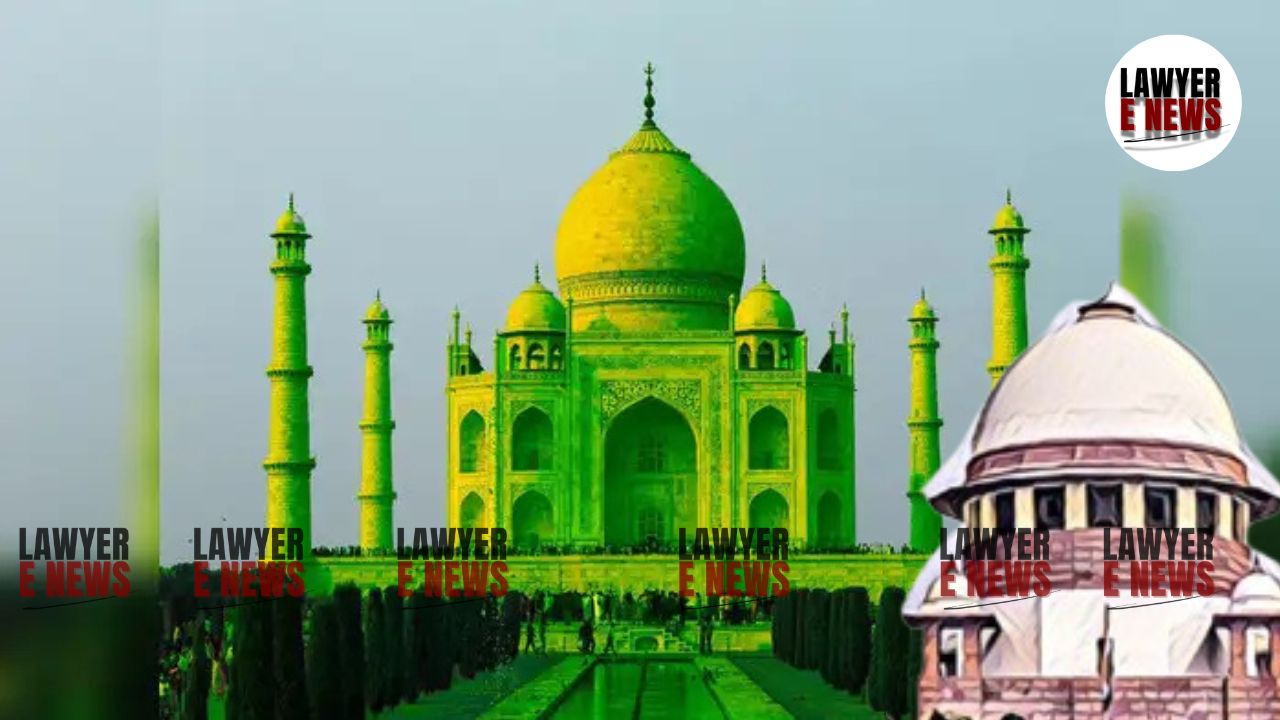-
by Admin
16 February 2026 1:47 PM



When State Imposes Restriction on Use of Land for Public Purpose Without Acquisition, Compensation is Mandatory ❞ — In a significant decision Supreme Court directed the Union of India to compensate the Thakur Rangji Maharaj Temple Trust for the loss of use of its land due to restrictions imposed under Section 20A of the Ancient Monuments and Archaeological Sites and Remains Act, 1958. A Bench comprising Justice Abhay S. Oka and Justice Ujjal Bhuyan held that “in view of the restrictions under Section 20A(1), compensation is payable under Section 27 read with Section 28 of the 1958 Act.”
The Court, while disposing of the long-pending appeal, rejected the argument that the landowner should be left without remedy merely because the land falls within the prohibited 100-meter zone around the Taj Mahal.
❝ Ownership Not Disputed — Yet No Injunction Was Granted Because of Environmental Orders of Supreme Court ❞
The case concerns land measuring about 3 Bighas 1 Biswa belonging to the temple trust at Mauza Basai, Agra, which was found to be privately owned by the appellant. The land, however, had been used for creating a green belt as part of the Taj Mahal Environmental Protection Programme, in compliance with Supreme Court orders passed in M.C. Mehta v. Union of India, Writ Petition No.13381 of 1984.
The Trial Court, First Appellate Court, and the High Court, while recognizing the appellant's ownership, refused to grant injunction, citing that the Archaeological Survey of India (ASI) was implementing the Supreme Court's directions regarding beautification and creation of a green buffer zone around the Taj Mahal.
The Supreme Court noted, “there is no dispute that the Taj Mahal is a protected monument and the subject land falls within the prohibited area as per Section 20A.”
❝ Section 20A Imposes Restrictions but Does Not Mandate Acquisition ❞ — Court Clarifies Scope of the Act
Explaining the legal position, the Bench referred to Section 20A(1) which prohibits construction or other activities within 100 meters of a protected monument. The Court observed:
“There is no provision under the 1958 Act which compels the ASI or the Government to acquire the area governed by Section 20A(1). But, in view of the said provision, there will be restrictions on the use of the said land.”
The Court clarified that the statute mandates restrictions but does not automatically vest ownership or possession with the State or the ASI. Thus, while the temple trust continued to be the legal owner, it could not fully enjoy or utilize its property.
❝ Compensation is the Remedy for Loss of Use Due to Restriction ❞ — Supreme Court Directs Union to Pay
The Supreme Court firmly held that the temple is entitled to compensation. Referring to Section 27 of the 1958 Act, the Court remarked:
“Section 27 provides that the owner or occupier of the land who has sustained any loss or damage or any diminution of profits due to exercise of any power conferred by the 1958 Act shall be paid compensation by the Central Government for the extent of such loss, damage etc.”
Further, it was held that the determination of such compensation must be done as per Section 28, which lays down that it should follow the procedure of the Land Acquisition Act, 1894, read with relevant provisions.
The Court directed, “The Union of India shall determine the compensation payable to the appellant in terms of Section 27 of the 1958 Act in accordance with the procedure laid down under Section 28 thereof, within a period of six months.”
❝ Appellant at Liberty to Seek Higher Compensation Based on Right to Fair Compensation Act, 2013 ❞
Interestingly, during the hearing, the appellant submitted that the compensation should be computed considering the more recent provisions of the Right to Fair Compensation and Transparency in Land Acquisition, Rehabilitation and Resettlement Act, 2013. While the Court did not rule on this issue directly, it left the matter open, observing:
“It is for the appellant to urge this issue before the competent authority of the Union of India while the compensation is determined in accordance with Section 27 read with Section 28 of the Act.”
This opens the door for the temple trust to seek enhanced compensation based on modern valuation standards.
Ultimately, the Court disposed of the appeal by affirming the appellant’s right to compensation and ordering its determination within six months. This judgment reinforces that restrictions imposed for public interest on private land without acquisition will attract compensation under statutory provisions.
The Court ended with a clear directive: “The Union shall complete the compensation process and make the payment to the appellant within six months.”
Date of decision: 20th March 2025
